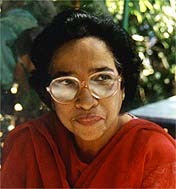Kanpur,
the industrial capital of Uttar Pradesh in India, was once known by its
anglicized name Cawnpore. Here in the mid-19th century lived Fanny
Parkes -“Lady of the Raj”, a maverick who flaunted Victorian norms, hobnobbed
with colonized Indians and scandalized the entire British community in India
with her love for all things Indian.
Frances
Susannah Archer was born in Conway, Wales in 1794, to Anne and Major Edward
Archer. Her father served in India as A.D.C. to Lord Combermere. Fanny married
Charles Crawford Parkes, a writer for the East India Company and lived in India
from 1822 to 1845. For most part, she stayed in Cawnpore and Allahabad after
her husband became Customs Collector for Cawnpore in 1830.
Fanny
was a woman with a striking personality and was very independent in her way of
thinking. Her love affair with India
began the moment she landed on the shores of Calcutta. Her early diary entry
said, “I was charmed by the climate. The weather was delicious and I thought
India was the most beautiful country.”
She was fascinated by Indian culture, the beauty of
the countryside, temples and God men, snake charmers and astrologers and the
beautiful women in their colourful costumes. She thought Indian men were
‘remarkably handsome.’ Fanny hated British arrogance in dealing with the local
people, their oppression and enslavement of the Indians and the exploitation of
the wealth of the country.
Not
for Fanny the boring role of wife to a humorless employee of the East India
Company. The wide open spaces beckoned. Emily Eden her occasional travelling
companion said, “Her husband always goes mad in the cold season. So she says it
is her duty to herself to leave him and travel about.”
A nature lover, she spent less time with her husband
and more time roaming the country.
“How much there is to delight the eyes in this
bright beautiful world!” she wrote in her diary. Fanny travelled all over the
country on her horse and with her portable travelling tent. She studied Urdu,
delved into Hindu mythology, learnt how to play the sitar and had a great
admiration for Indian culture.
Fanny
kept detailed accounts of her travels, her exploits and observations. She even
had her own yacht “Seagull” on which she navigated the rivers of India. But in
spite of her love for the country, she was critical of the plight of women and
the inhuman practices of Sati and
child marriages, the purdah system and meaningless rituals of mutilating the
body. Famine, plagues and poverty were other situations that bothered her.
Fanny’s
notes about the Colonial rule in India were not complimentary. She was critical
of British arrogance. She lampooned the sloppy dress sense of English women
with their uppity airs, and the stiff uniforms and solar topees of the men. Her powers of observation enabled her to give
vivid descriptions of Hindu deities and rituals. Rib-tickling anecdotes and
amusing stories were also included.
Fanny
tried her hand at farming in Allahabad. Taxidermy was another of her hobbies. In
her “Cabinet of Horrors” she displayed skulls of tigers, crocodiles and hyenas.
She made replicas of cobras, scorpions and locusts from arsenical soap and stuffed
them with cotton.
Back
in England, her detailed diaries helped her compile her memoirs. They filled two
bulky volumes titled “Wandering of a Pilgrim in search of the Picturesque, after
four and twenty years in the East, with revelations of life in the Zenana.”
As a travel writer, she wrote without prejudice, giving
detailed and honest accounts of Indian life in the 19th century. Her
descriptions were so accurate that hundred years later, a resident of Cawnpore was
able to recognize the Collector’s bungalow where she lived. He was instrumental
in having a commemorative brass plaque for Fanny Parkes put up in April 1936, by
Frank Mudie the then Collector.
Kanpur
has all but forgotten this feisty, Urdu-speaking, sitar-playing, cigarette smoking
British Memsahib for whom ‘Vagabondising
in India’ was a pleasure, and exposing the ‘Philistinism of the English’ a duty.
Her memoirs have been condensed into a convenient paperback
titled “Begums, Thugs and White Moghuls” by William Dalrymple another British writer
who has made India his home.

No comments:
Post a Comment